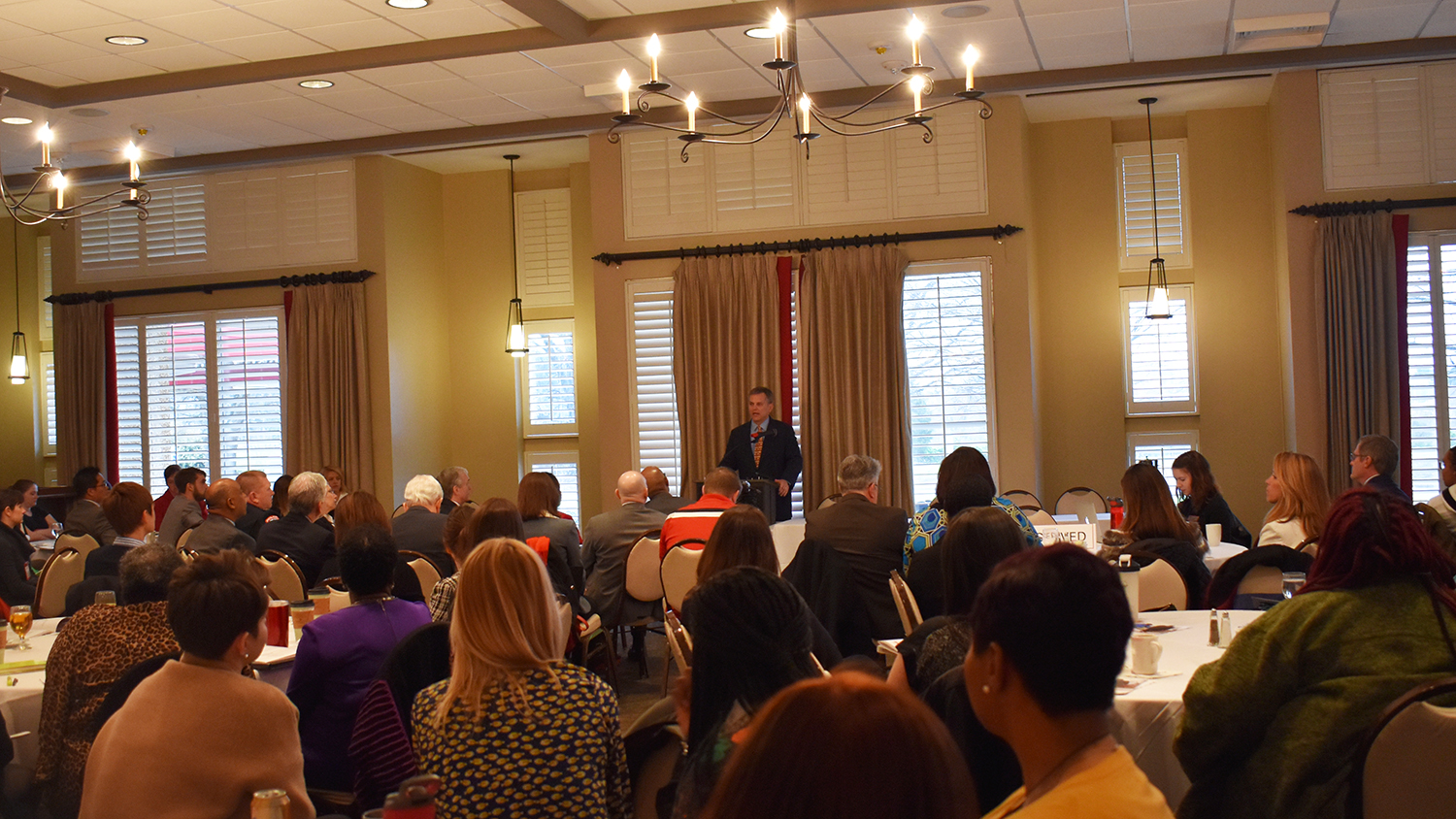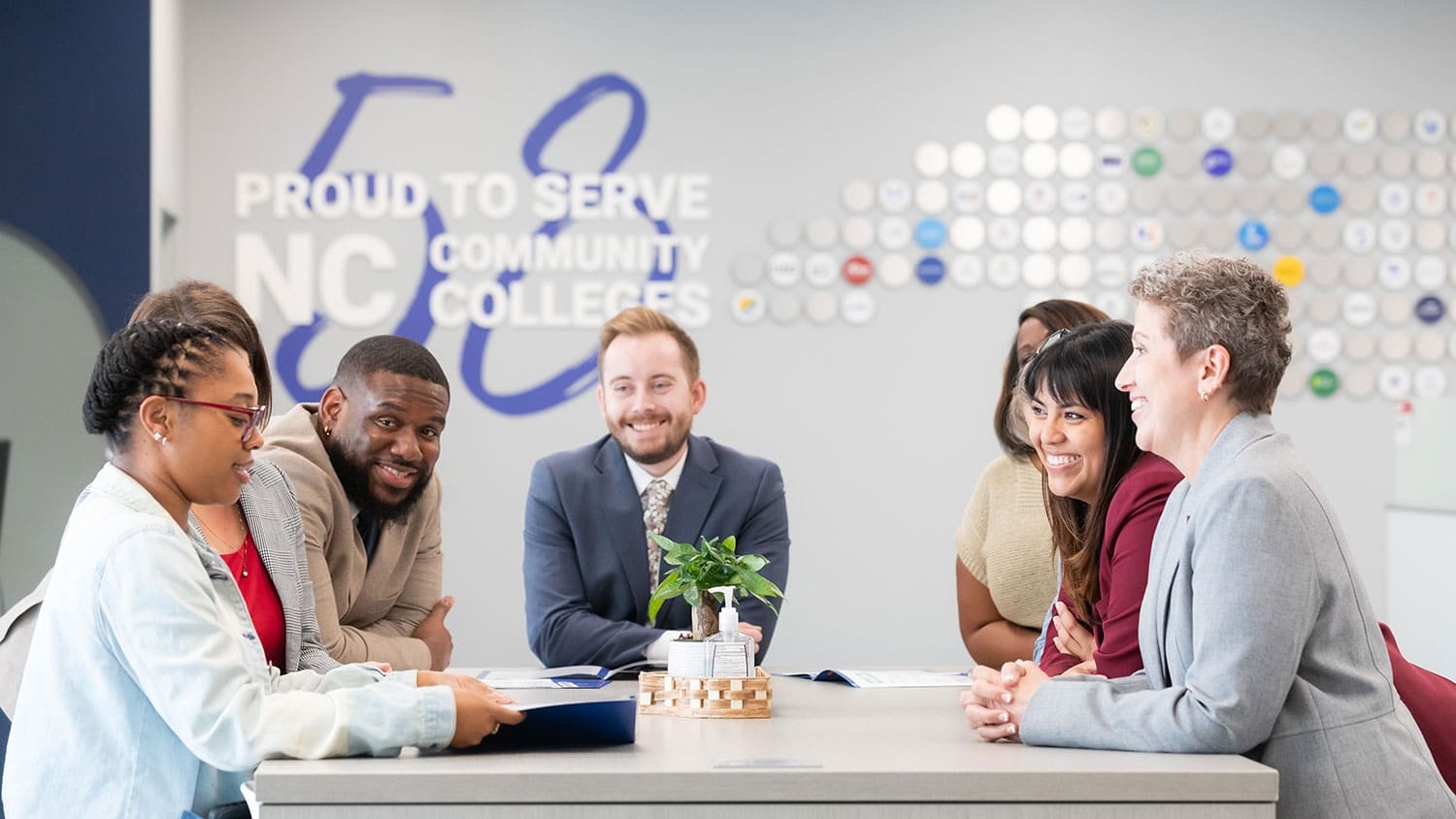Interdisciplinary Summit Brings Together Teachers, Social Workers to Focus on How to Strengthen Families, Communities and Schools

More than 200 educators and social workers attended the Strengthening Families, Communities and the Schools That Serve Them: An Interdisciplinary Summit on Tuesday, March 27, 2018, at the NC State University Club. Hosted by NC State’s Department of Social Work and College of Education, the summit invited thought leaders and experts in education and social work to lead the discussion on issues like poverty, inclusion and the role of families in education.
N.C. Attorney General Josh Stein served as the keynote speaker. “How much better would the world be if everyone was a social worker or educator?” Stein said. “Social workers and educators: You help people live fuller, healthier and better-educated lives.”
After his address, there were breakout sessions featuring representatives from NC State, universities across the state, the N.C. State Board of Education, the Wake County Board of Commissions and the Wake County Board of Education, among other organizations.
Those breakout sessions included disAbilities: Building Strength Through Inclusion, Strengthening Our Society Through Schools, and Serving Students’ Needs Through Interdisciplinary Collaboration, they provided a space for dialogue between panelists and summit participants, as well as between social workers and teachers.
“Having social workers alongside educators was great,” said David Fitzpatrick, teaching assistant professor in NC State’s Department of Social Work. “We came together and we were all focused on one point: to help students.”
“We want to make sure this [type of interdisciplinary summit is] not a one-time thing,” added Anona Smith Williams, associate dean for student success and strategic community engagement at the NC State College of Education. “We want to have different voices at the table. We are all agents of change.”
12 Other Things Said During the Interdisciplinary Summit
“One of the biggest problems we face in North Carolina is the opioid epidemic. . . . The problem is quite dire, and it will worse before it gets better. . . . We can change behavior if we have the right messages, the right collaborations and sufficient time.” — Josh Stein, N.C. Attorney General
“You cannot change an institution if you do not understand the institution.” — Jessica Holmes, Chair, Wake County Board of Commissioners
“Learning how to be a listener becomes really important when you become a change agent.” — James White, Executive Vice President of Organizational Relations, YMCA of the Triangle
“We worry a lot about our competitiveness within K-12 education compared to other nations. If we had the economic structure the other 34 advanced nations have, normal levels of poverty, we wouldn’t have to worry about how competitive our students are.” — Gene Nichol, Boyd Tinsley Distinguished Professor, UNC School of Law
“Until you have hard discussions, perceptions will keep both arenas from working together to produce better outcomes.” –Terrance Ruth, Lecturer, NC State’s Department of Social Work
“Often when we talk about Latino students and families, we start the conversation by talking about their deficits and limitations. So, our first step in supporting them is to identify their strengths and assets first.” — Iliana Santillán-Carrillo, Community Organizer, El Pueblo, Inc.
“Word choice is important. Parent involvement is not the same as parent engagement: instead of telling parents this is what we need, you have to let the community have a voice.” — Darlene Johnson, Director of School Social Work with the Wake County Public School System
“I encourage you to not to try to do it all. It is a trap we sometimes get in, but try to realize you are a professional educator. Some people are trying to make it out that you are a mother to children who are not your own, but your job is to give students the best education that you can.” — Andy Taylor, Professor of Political Science, NC State’s School of Public and International Affairs
“We need more teachers, and we need more social workers. If more social workers were in schools, then teachers could do their job better. You could impart knowledge and teach rather than having to deal with psychosocial issues that you have to deal with because there are not enough social workers.” — Karen Bullock, Head, NC State Department of Social Work
“For some students, being able to get to school and being present that day took everything they had to get there. Counselors, social workers and teachers less likely to take that for granted because we interact with them so much; but really I can use a wake-up call some days and think about some of the students and ask: What did it take for them to get there? Sometimes what they did to get to school that day was instrumental and insurmountable. Sometimes a student just being there [in school] is a victory.” — Chuck Small ’11MED, Counselor, Enloe High School in Raleigh
“We hear this buzzword ‘evidence-based research’ and ‘evidence-based intervention.’ It’s really important to look at who that intervention has worked for and under what conditions. Everything is not always applicable to everyone. Now that does not mean we need to lose all hope; we certainly need to meet the individual needs of our students. But we do need an understanding of how can we then adapt that. I always ask my teachers to look at who the sample of the study. Who was this study done on? . . . Ask these important questions: Is this applicable and how might it need to be adapted to make sense for the population you’re serving.” — Charity Brown Griffin, Assistant Professor of Psychological Sciences, Winston-Salem State University
“Before I entered the classroom as a teacher, the best piece of advice I received was to pick my battles. I thought that meant dealing with behavioral issues, but now I realize that means how to advocate for education. I may not be able to solve a student’s root issue, but I can help them cope. I can create an environment for them to learn.” — Jessica Peacock, ’17MAT, Math Teacher, Carnage Middle School in Raleigh
- Categories:


